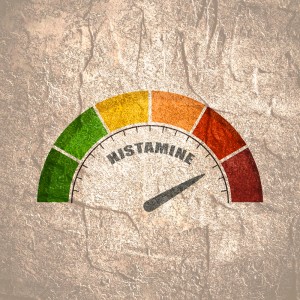The Link Between Dehydration, Magnesium, and Histamine
 I have forwarded Dr. Martin’s essay as I find his writing so easy to follow and very informative.
I have forwarded Dr. Martin’s essay as I find his writing so easy to follow and very informative.
Hey, It’s Dr. Martin here…
I want to talk about an ‘old’ study that examines the physiology of brain histamine.
and how this study gives some crucial insights into histamine.
Remember, histamine is a messenger molecule that many cells in your body use to talk with each other. This is one reason why you need some histamine.
Histamine is also released by mast cells (a type of white blood cell) during periods of stress and allergy. So histamine is an essential part of your normal immune response.
Now, mast cells are found in almost every tissue in your body. But they’re primarily found in areas CLOSEST to the external environment – your skin, lungs, and G.I. tract.
That’s why itching, redness, swelling, and increased mucus production are common allergic reactions. But your body also releases histamine during periods of stress.
When you’re stressed your adrenal glands secrete cortisol and adrenaline. These two hormones stimulate your nervous system which activates your mast cells…and releases histamine.
Here’s what too much histamine can do to your body:
Stimulates more mucus production — messing up your sinuses, lungs, or throat.
Constricts the bronchi in your lungs — causing wheezing, coughing, or asthma.
Too much histamine can even affect your gut by causing cramping and diarrhea.
Now, back to the ‘old’ study I mentioned earlier. Here’s what researchers found:
“Histamine release is enhanced under extreme conditions such as dehydration or hypoglycemia or by a variety of stressors.”
Here’s what people don’t know about histamine when you’re dehydrated — you secrete more histamine. And more histamine means more symptoms.
Most people think that being dehydrated only means not drinking enough water. While most people don’t drink nearly enough water dehydration can also happen when someone isn’t getting enough electrolytes and key minerals….Mainly salt, potassium, and MAGNESIUM.
Here’s something doctors don’t know about magnesium when your histamine system is working the way it should and your mast cells secrete histamine, then your body makes an enzyme called Diamine Oxidase (DAO).
Think of Diamine Oxidase (DAO) as a mop that quickly removes histamine after its release. DAO is your body’s way of ensuring you’re not flooded with too much histamine and gets a bunch of allergy symptoms.
If you can’t make enough DAO, then histamine accumulates, and you end up with chronic symptoms like asthma, hives, rashes, coughing, sinus congestion, and gut issues.
Well it turns out that you can’t make Diamine Oxidase (DAO) without magnesium.
So, if you’re not getting enough water, and you’re low in magnesium. You’re going to have a problem with histamine.
Not only did the researchers find that being dehydrated causes more histamine release they also found that hypoglycemia — or low blood sugar — also causes you to make more histamine.
There’s a reason why people notice a drastic difference in allergy symptoms when they’re eating low-carb. When you’re eating low carb, your blood sugar levels are more stable, which positively affects histamine.
That’s why my favorite natural approach to allergies is…
• Drink more water.
• Take electrolytes.
• Get enough magnesium.
• Quercetin
Read also: Dehydration
Read also: Electrolytes
Read also: Our need for Water
Read also: Magnesium
Read about Histamine Relief by Micro Balance Health Products
STILL HAVE QUESTIONS? EMAIL AND GET YOUR QUESTIONS ANSWERED
Sign up to receive the MCVitamins Newsletter!
Up-to-date info on the latest health-related news happening in the world
(available in English only)

